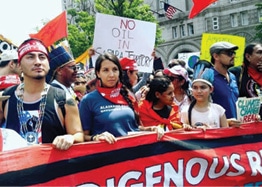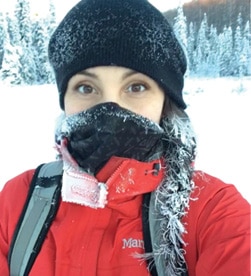Karla Brollier grew up with ancestral stories about her indigenous Alaskan people and the land that sustained them. She remembers witnessing the annual migratory pattern of caribou in the spring and fall, and fishing in the summer. The stories passed down from generation to generation shared and instilled values of respect and reciprocity present in the interconnections between people and nature where her community thrived for thousands of years.

Alaska, known for its glaciers and long, cold winters, is not immune to the world’s changing climate. It is the frontline for climate change and its effects are very apparent to those that rely on the consistent reciprocity for survival. “When you spend so much time in the environment, relying on the world and nature around you, you pick up on the most subtle of shifts,” Brollier shared.
Native communities are perched at the forefront of climate affects. Indigenous communities are already experiencing how the changing climate can disrupt traditional ways of life that have been preserved for thousands of years. For example, traditional permafrost ice cellars are thawing and filling with water as temperatures rise, leaving many without the ability to store whale meat—a mainstay of the Arctic coastal community diet—throughout the year.
As sea levels rise and food supplies are jeopardized, communities are also faced with the unique challenge of adapting to a rapidly changing environment while still operating from traditional values. Brollier wants to make sure her community and others like hers can write their own narrative to be empowered in the face of climate change. She also is dedicated to ensuring indigenous communities can lend their knowledge and voices to climate work on a larger scale.
This desire motivated Brollier and a team of other indigenous women to form the Climate Justice Initiative. The organization’s priority is to provide communities with the resources to lead with resilience and adapt to climate change while keeping their traditional values intact. This Climate Justice Initiative is not only the first Indigenous climate change organization in the US, but also the first that is led by a founding board of Indigenous women.
The Climate Justice Initiative started to recognize common themes among the experiences of many indigenous communities at the front lines of climate change.
“While facing something as complex and daunting as climate change, you’re going to continuously push yourself and push past those comfort zones and the mentality of ‘this is what we have always done’, you have to find those brave places to have balance and maintain hope through some of the harder parts of it,” she said.
Ultimately, she wants the narrative around climate change to shift towards hope and away from fear and to rewrite the script to focus on protecting the most vulnerable in our communities. She notes that there are many ways to make change, and this is just one way to do so.

Brollier says she is often asked how to get involved in climate work when it all seems too big to tackle, especially when media perpetuates an urgent narrative of a doomed future. She is also asked how to get involved and make change while maintaining one’s own health and well-being. Her answer is to start getting involved anywhere and however you can, to learn about the actual impacts of climate change, and examine your own life and identify changes within the realm of your control. Just starting somewhere small is better than doing nothing.
This is an excerpt from a Seattle Globalist article:
www.seattleglobalist.com/2019/07/31/karla-brollier-and-climate-justice-initiative-are-rewriting-the-script-about-communities-facing-climate-change/87194
